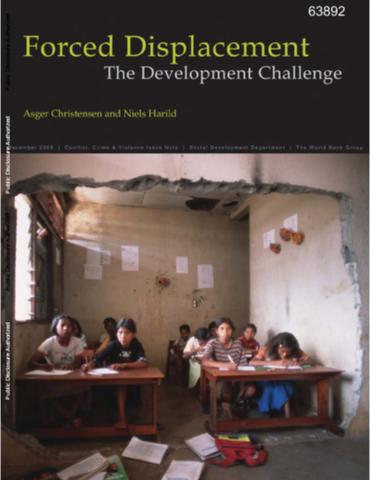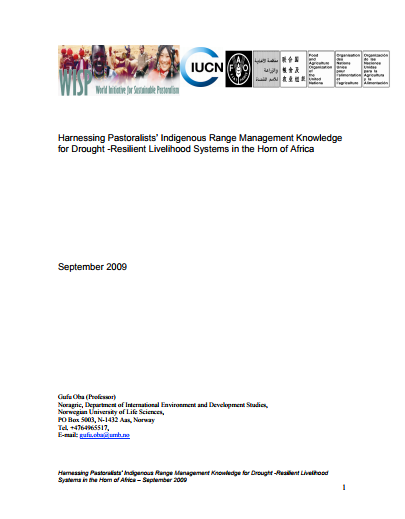Forced Displacement
This note discusses the development dimensions of forced displacement, and the potential role of the World Bank to address these dimensions and contribute to durable solutions for group's who have returned from or are in displacement situations. For the purposes of this note, forced displacement refers to the situation of persons who are forced to leave or flee their homes due to conflict, violence, and human rights violations.
We're only asking for what is ours' indigenous peoples in Paraguay - Yakye Axa and Sawhoyamaxa
The right to adequate food and indigenous peoples
This paper focuses on the analysis of the right to food from an indigenous peoples’ perspective and addresses the main issues of concern to indigenous peoples that crosscut the right to food. Furthermore, it analyses how right to food is relevant to indigenous peoples and how the implementation of the right to food can benefit them.
Participatory Land Delimitation
Land Tenure Working Paper 13: Secure land rights are crucial if local populations are to engage actively as stakeholders in rural development.
The right to food guidelines and indigenous peoples:an operational guide
This Guide aims to assist indigenous peoples and their organizations on how to use the Voluntary Guidelines to Support the Progressive Realization of the Right to Adequate Food in the Context of National Food Security1 (hereafter “Right to Food Guidelines” or “Guidelines”) to promote their own interests in the area of food security.
Pueblos Indígenas y Tribales: Construyendo la Diversidad Biológica y Cultural para la Seguridad Alimentaria y de los Medios de Vida
Cuando en el año 2000 se aprobaron los Objetivos de Desarrollo del Milenio (ODM), la comunidad internacional contrajo un compromiso sin precedentes para satisfacer las necesidades de los pobres del mundo y salvaguardarlos de las amenazas del siglo XXI2. Los mandatarios de 147 Estados reafirmaron los principios de reducción de la pobreza, gobernanza democrática y protección de los derechos humanos, que han sido el núcleo del sistema de las Naciones Unidas desde su creación tras la Segunda Guerra Mundial.
Voluntary Guidelines for Good Governance in Land and Natural Resource Tenure
Land Tenure Working Paper 9. Based on international authoritative documents, this paper draws 14 principles to be taken into account when developing Voluntary Guidelines on Responsible Governance of Tenure of Land and other Natural Resources. The paper sees Voluntary Guidelines as human-rights based documents that provide a framework and a point of reference for national and international policies.
The Code of Conduct for Responsible Fisheries and Indigenous Peoples
This guide is designed for indigenous fishing communities and for people in the development field working with indigenous fishing communities. Its objective is to provide guidance on impacts and benefits of the Code of Conduct for Responsible Fisheries (hereinafter the ‘Code’) from an indigenous peoples’ perspective.
Finding Food in Fear/Living in Fear (video)
Finding Food in Fear/Living in Fear
Introduction for ‘one family’....
In February 2010, Burma Issues conducted a field trip inside Karen State to raise internally displaced persons’ (IDPs) awareness of the upcoming elections. While they were watching a video, the township where the IDPs were staying was attacked by the Burmese army. They had to flee into the jungle and our cameraman decided to follow.
Harnessing Pastoralists’ Indigenous Range Management Knowledge for Drought -Resilient Livelihood Systems in the Horn of Africa
This report on harnessing pastoralists’ indigenous knowledge of rangeland management in three countries in East and the Horn of Africa is presented in two parts. The first part presents a review of the literature. The second presents the findings from the Orma in Tana River District of Kenya, the Afar in Amibara and Gawane Districts of the Afar Regional State in Ethiopia and the Karamojong in the Moroto District of Uganda.
10,000 Shans uprooted, 500 houses burned in Burmese regime's latest scorched earth campaign
10,000 Shans uprooted, 500 houses burned in Burmese regime’s latest scorched earth campaign (press release)...
Map of villages forcibly relocated...
Summary of villages forcibly relocated...
Images of the Burmese regime's latest scorched earth campaign





